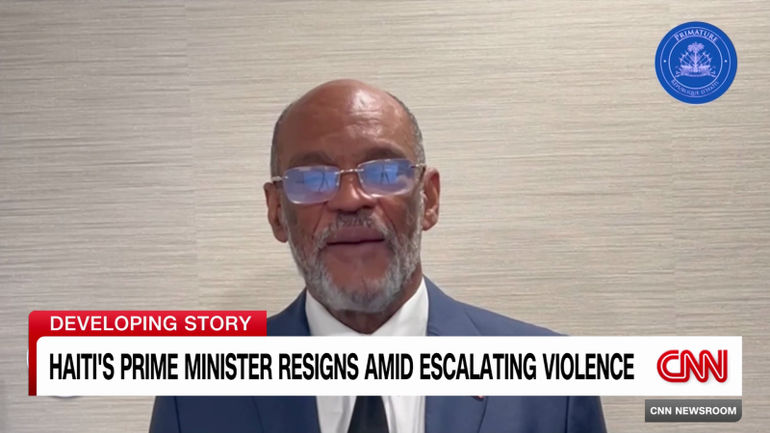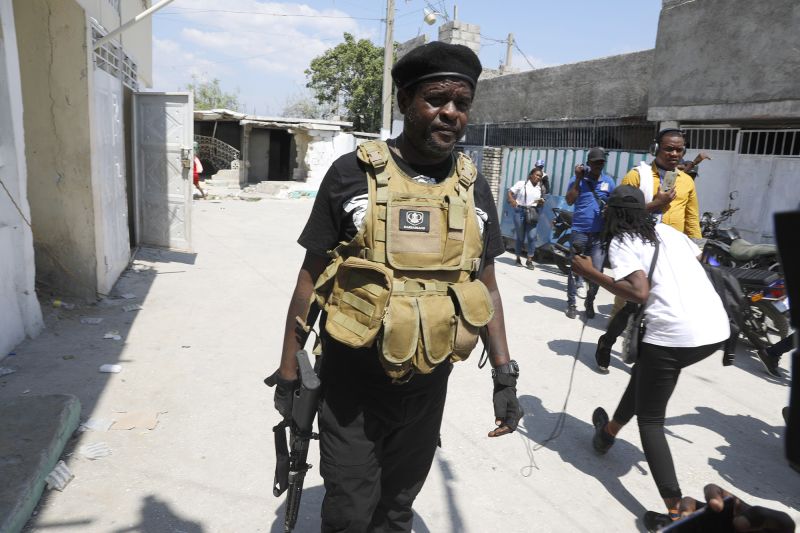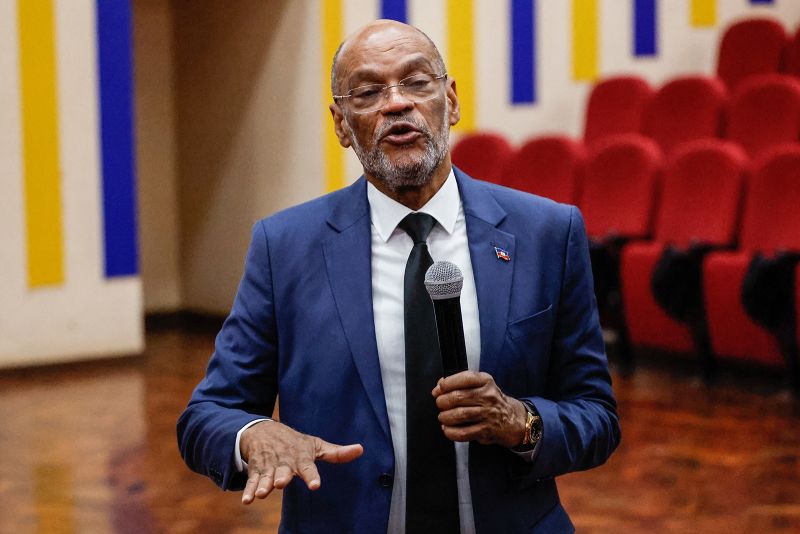
Impact of Haiti's Prime Minister Resignation on the Country's Stability

Following pressure from regional leaders, Haiti's Prime Minister Ariel Henry has decided to step down amidst escalating gang violence and widespread public dissatisfaction. Will this resignation help restore peace and stability in the troubled nation?
Haiti's Prime Minister Ariel Henry has announced his resignation after a meeting with Caribbean leaders on Monday. He made this decision as law and order deteriorated in Haiti and there was increasing international pressure for him to step down.
Henry has been in Puerto Rico since last week, unable to return to Haiti from a visit to Kenya due to the violence that erupted in his absence.
In Henry’s absence, a transitional council will be set up with certain presidential powers, such as appointing a new interim prime minister. This government is anticipated to organize elections in the future for a full political overhaul.
The timeline for forming the transitional council and initiating the power handover remains uncertain. Former Haitian PM Claude Joseph mentioned to CNN that it could potentially be formed within a day.
CARICOM announced that the council will have members from different political groups and non-voting observers from religious and civil organizations.
A senior official from the US State Department mentioned that the seven political factions must inform CARICOM within 24 hours about their chosen representative for the transitional council.
Will the deal restore order?
The big question is whether these changes can bring calm to Haiti, and put a stop to the terrible violence tearing apart Haiti’s capital Port-au-Prince.
Haiti has been in a state of emergency ever since a group attacked the largest prison in Port-au-Prince earlier this month. This incident resulted in the death and injury of police and prison staff, as well as the escape of around 3,500 inmates.
One of the gang leaders, Jimmy "Barbecue" Cherizier, claimed responsibility for the attack. He stated that the jailbreak was an effort to overthrow the government led by Henry.
Gang leader Jimmy “Barbecue” Cherizier took credit for an attack on a prison and said the jailbreak was an attempt to overthrow Henry’s government.
Gang leader Jimmy “Barbecue” Cherizier took credit for an attack on a prison and said the jailbreak was an attempt to overthrow Henry’s government.
According to United Nations estimates, gangs now dominate 80% of Haiti's capital. They are still battling for control of the remaining areas. During Henry's absence from the country, gangs besieged the main airport to block his safe return.
The current turmoil has caused tens of thousands of people to leave their homes, in addition to the over 300,000 individuals who were already displaced due to gang-related violence.
The gangs in the country have deep connections to politics and business, which suggests that a period of transition where power struggles occur could lead to further unrest on the streets.
"The focus here is on the connection between politics and criminal activities in Haiti. It is crucial to understand that the current situation in Haiti is driven by political factors. We need to view and interpret the events unfolding through a political perspective," explained Romaine LeCoeur, a senior expert at the Global Initiative against Transnational Organized Crime based in Switzerland, in an interview with CNN regarding the escalating violence in Haiti before the CARICOM announcement.
The question arises: will the gangs have a role within the government?
According to CARICOM, the transitional council will have members from various factions like Montana Group, Fanmi Lavalas, Collectif, Petit Dessalinnes, EDE, and December 21. Additionally, two non-voting observers from the religious sector and civil society will also be part of the council.
Haitian Prime Minister Ariel Henry, speaks to students during a public lecture on bilateral engangement between Kenya and Haiti, at the United States International University (USIU) Africa, in Nairobi on March 1, 2024.
Haitian Prime Minister Ariel Henry gave a public lecture at the United States International University (USIU) Africa in Nairobi on March 1, 2024. He spoke to students about the importance of bilateral engagement between Kenya and Haiti.
The event was captured in a photograph by Simon Maina/AFP/Getty Images.
Related article
Haiti’s leader resigns as gangs run rampant through country engulfed in crisis
The statement clarifies that individuals who have been charged or convicted in any jurisdiction are not eligible to serve on the council. This condition would exclude several well-known figures, such as gang leader Jimmy Cherizier, also known as Barbeque, who has been viewed as having political ambitions and has claimed responsibility for the recent surge in gang attacks in Port-au-Prince.
The announcement has been praised as a positive step forward by the United States and other regional actors. However, some key voices in the recent unrest have not reacted positively to it, despite Henry's resignation.
Cherizier issued a warning late Monday night, stating that the alliance of gangs called Viv Ansanm would not acknowledge any government formed from the CARICOM agreement.
In a video on Monday night following the announcement of the CARICOM agreement, Cherizier declared, "Viv Ansanm will not accept any government that comes from these meetings. It is the responsibility of the Haitian people to choose the leaders of the country."
An adviser to Guy Philippe, the former rebel leader who recently returned to Haiti and called for “revolution” against Henry last month, warned that excluding Philippe from any new government could lead to his supporters "setting the city on fire."
The CARICOM statement also placed notable restrictions on involvement in Haiti’s upcoming government, which could provoke anger or prompt allegations of interference in a country with a complex history of foreign intervention.
The Caricom statement states that anyone who does not support the UN Security Council resolution for a foreign military mission in Haiti cannot be on the council.
Following this, Kenya, who is leading the operation, mentioned that their troops are currently in "pre-deployment" mode.
On Tuesday, a senior official from the State Department mentioned that they will approach the situation one step at a time.
They emphasized the importance of both democracy and governance, as well as security. This is why they plan to keep advocating for the multinational security support mission.
Henry had made the initial decision on Friday to step down, as confirmed by a senior US administration official. Secretary of State Anthony Blinken engaged in discussions with Henry and the president of Kenya, William Ruto. Further talks with regional leaders took place, eventually leading to an emergency meeting of CARICOM on Monday.
The meeting on Monday lasted over seven hours and included discussions with "almost 40 Haitian stakeholders" and the CARICOM heads, as reported by a US State Department official.
According to a US senior administration official, the interactions with stakeholders were very intense, with various possibilities for the transitional council being considered.
The senior State Department official mentioned that the main topic of discussion during Monday's meeting was the formation of the transitional presidential council. According to the official, a significant portion of the high-level meeting involved the Secretary and other participants from different countries gathering in a corner to outline the composition of the council on a piece of paper. This included determining the representation of various factions within the council.
The senior administration official mentioned that there were discussions with Henry on Monday regarding his plans to step down and transfer power to a new transitional entity called the presidential college, as he informed CARICOM leaders and the officials. Blinken was one of the officials who had a conversation with Henry on that day.
According to a senior administration official, Barbados Prime Minister Mia Mottley reached out to Henry. They had a conversation, and then she requested the Secretary to speak with him.
The official described their discussion as the Secretary inquiring about Henry's plans. They discussed the next steps towards establishing a transitional government. Henry also mentioned his previous decision to step down and shared that he was consulting with his cabinet.
Henry met with his cabinet at 8:30p ET Monday to discuss his decision, this official said.
Will Ariel Henry return to Haiti?
Henry has been in Puerto Rico since last Monday. The US official mentioned that they anticipated Henry may want to come back home eventually. From the US point of view, Henry is allowed to stay in Puerto Rico or travel elsewhere as he wishes.
However, currently, it is evident that traveling is not safe for Henry. Gangs that are against Henry's leadership are widespread in Port-au-Prince. As of Monday night, Henry was still in Puerto Rico, unable to return home.
"Haitian stakeholders emphasized the importance of avoiding reprisals against Prime Minister Henry or his allies," stated the official.
The United States will be providing $300 million to support the Kenyan-led multinational security mission, Blinken revealed following his participation in the CARICOM meeting on Monday. Additionally, he disclosed an extra $33 million in humanitarian aid for the people of Haiti.
The official mentioned that the US funds for the multinational security support mission help in preparing for the logistics, equipment, and procurement needed for the Kenyan-led MSS deployment.
Reporting for this article was contributed by CNN’s Michael Rios.
Editor's P/S:
The situation in Haiti is dire, with gangs controlling 80% of the capital and violence escalating. Prime Minister Ariel Henry's resignation and the formation of a transitional council with limited powers may provide a glimmer of hope, but the road ahead is fraught with challenges.
The key question is whether the transitional council can restore order and bring an end to the violence. The council's composition, with members from various political factions, religious groups, and civil society, suggests an attempt at inclusivity. However, the exclusion of key figures like gang leader Jimmy Cherizier raises concerns about the legitimacy and effectiveness of the council. Moreover, the deep connections between gangs and politics in Haiti could lead to further unrest during the transition period. any external assistance should be guided by their needs and aspirations.















